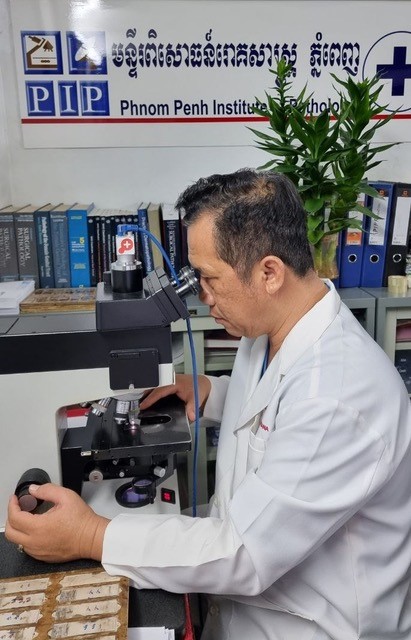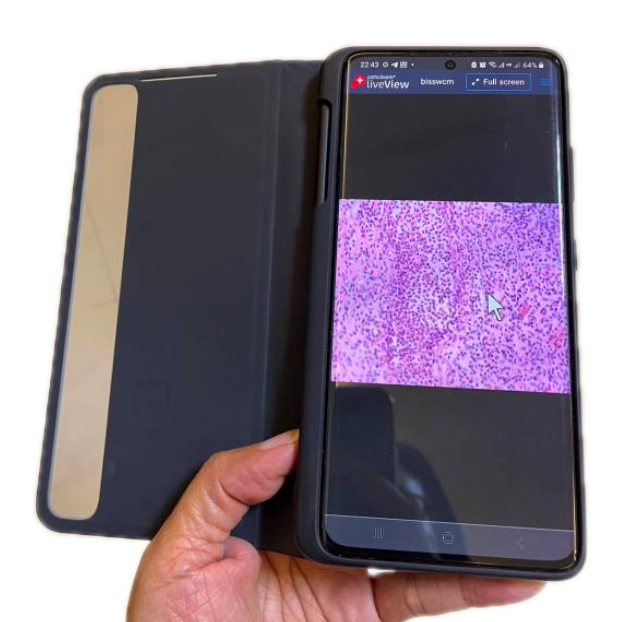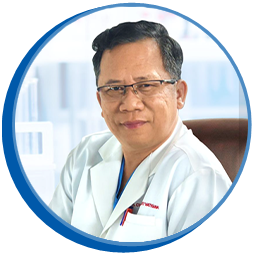Educating the Next Generation of Pathologists in Cambodia
For this interview we spoke to Prof. Chuut Serey Vathana, who teaches pathology, histology and embryology to residents at the University of Health Sciences in Phnom Penh.
PathoZoom® Camera Replaces Multi-Head Microscope
With there being no university hospital in Phnom Penh, Prof. Vathana teaches the residents in his private institute (Phnom Penh Institute of Pathology). There, the PathoZoom camera has become an important part of the teaching, as it replaces the missing multi-head microscope. And since the Covid-19 pandemic, it has become indispensable.
Cambodia was hit hard by Covid, and teaching was completely moved to the digital space. Prof. Vathana is glad that the residents have access to the slides from home and can develop ideas or ask questions online. By combining PathoZoom® LiveView with Microsoft Teams or Zoom, he can even teach live at the microscope.
A New Generation of Pathologists Emerges in Phnom Penh
Prof. Vathana is already training Cambodia‘s second cohort of pathologists in Phnom Penh, drawing on his international contacts. Colleagues from abroad, especially from Germany and Japan, teach the residents on-site during a trip, or online. This support is particularly welcome, as there are still only few trained pathologists working in Cambodia.
To reach the international level in pathology residency, most of Prof. Vathana‘s trainees travel abroad with the help of a scholarship. Many continue their training in Europe.
How Prof. Vathana Became One of a Few Pathologists in Cambodia
Prof. Vathana also completed part of his training abroad. With the help of a scholarship, the general practitioner studied pathology for two years in Belgium, where unfortunately he was unable to complete his training by the time the support expired. The young doctor then returned to his home country and initially worked as an internist until 2001, when he met a pathologist from Germany who wanted to improve medical care in Southeast Asia using telepathology: Dr. Gerhard Stauch.
The retired pathologist gave his Cambodian colleague a scanner to discuss cases together, and invited him to Germany for further training. He also assisted Prof. Vathana in equipping the pathology department at the Sihanouk Hospital Center of Hope and later with establishing his own institute, the Phnom Penh Institute of Pathology (PIP). Prof. Vathana is very grateful for his continued help, which also extends to the training of young pathologists: “He is 80 years old and still asks me if he can help.“
The Importance of Telepathology for Developing Countries
Prof. Vathana is convinced that telepathology is a great help for countries lacking materials and trained professionals. He was especially grateful that his colleagues from abroad were able to continue teaching the students during the Covid-19 pandemic since otherwise, classes would have had to be cancelled without replacement.
But telepathology is not only essential for training the future generations of pathologists: Prof. Vathana also uses his PathoZoom® camera when diagnosing difficult cases. Using the Scan and LiveView functions, the pathologist can directly share the images with colleagues:
“Without the camera, I wouldn‘t be able to get a second opinion.“
INTERVIEW PARTNER
Prof. Dr. Chhut Serey Vathana
Teacher for pathology, histology and embryology at University of Health Sciences
Pathologist at Sihanouk Hospital Center of Hope
Founder of Phnom Penh Institute of Pathology








